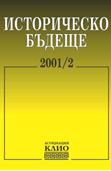Франкското царство - между селективната приспособимост и допустимия традиционализъм
The Kingdom of the Franks — between Selective Adaptability and Admissible Traditionalism
Author(s): Vesselina VachkovaSubject(s): History
Published by: Асоциация Клио
Keywords: Frank state; Middle Ages; barbaric kingdoms; Rome; Constantinople; Clovis; Charles the Great; Western Roman Empire; Franks; Ostrogoths; Westgoths; Vandals; Roman imperial power; Old Testament Patriarchs; Papacy
Summary/Abstract: The history of the Frank state characterized by an unbroken continuity during all Middle Ages is pointed out with reason, as an exception from the general scenario in the development of the so called “barbaric kingdoms”, founded in the lands of the Western Roman Empire. The researchers emphasize various reasons for the “uniqueness” of the Franks — the direct adoption of the catholic and not the “national” for the barbarians, aryan form of Christianity; the fact that their state is formed far enough from the two powerful centers — Rome and Constantinople; that it is stimulated by its “peripheral” geographic position etc. Undoubtedly, all explanations have their reasons, but according to us, they are rather an effect than a cause for the impressive vitality of the Frank realm. Because if the territories of their settlement are predetermined to some extent by their comparatively late establishment in Europe, so are all remaining features of Frank behaviour, being a question of choice, standing on all other barbaric peoples. The choice in question, could be formulated in the most concise form as: to what extent and in what way, the barbarians have to integrate themselves in the structures of Empire and Church, and how much must they and can they preserve from their cultural-political traditions. What is distinctive among the Franks, on one hand, is their demonstrated ability to get registered closely in the imperial institutional system, proving themselves as the most faithful ally of Christian Rome (even before the official conversion of Clovis) without demanding aggressively (contrary, for example, to the Ostrogoths) a high place in its political hierarchy or insisting on their non-alignment of principle towards the Empire (contrary to Westgoths and Vandals). On the other hand, even when Frank rulers are officially and consecutively recognized as Roman patricians and emperors, they categorically refuse to depersonalize themselves behind the emblems ‘patricius’ and even ‘imperator Romanorum’, stressing on the often exterior signs of their power, which are representing it as typically Frank. Clovis and his successors put on the chlamyde sent by Constantinople but preserve the sign of charismatic Frank power — the long blond hair. Charles the Great has nothing against the symbols of Roman imperial power, but always prefers national costume. In his private life and in government, he and his successors remain authentic Frank rulers — resembling much more to Old Testament Patriarchs, worried for their house (whose widened projection is their people) than Roman princeps, standing on principle beyond individual, family and national engagements. In this case it is important to stress that the preservation of certain tradition by no means, denotes, conformity to arbitrary ethnographic curiosities, but a will even intuitive, for individualization of Frank Christian state. Naturally, the safest way for achievement of such an individuality is the avoidance of
Journal: Историческо бъдеще
- Issue Year: 2001
- Issue No: 2
- Page Range: 3-31
- Page Count: 29
- Language: Bulgarian
- Content File-PDF

